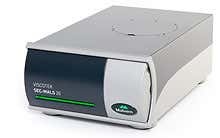Overview
The Viscotek SEC-MALS 20 is a modular multi angle light scattering detector that can easily be used with any existing SEC system, adding the power of light scattering detection for molecular weight and molecular size measurements. It can also be purchased as part of a complete system package. The signals from the SEC-MALS and other detectors connected to the system are analyzed by the most advanced GPC software available, OMNISEC.
The SEC-MALS 20 can be used to measure the absolute molecular weight and oligomeric state of proteins, independent of retention time. It can also be used to analyze natural and synthetic polymers, including the measurement of molecular size over the widest possible range.
- Up to 20 angles for more accurate results
- Measure absolute molecular weight and Rg
- Can be combined with any existing SEC system
- A single powerful software package to control the system and analyze data - OMNISEC
- Vertical flow cell with advanced radial optics for improved performance
- Stable and sensitive low angle detectors improve accuracy
- Small footprint
How it works
The SEC-MALS 20 multi angle light scattering detector is connected to the output of any SEC or GPC system, such as the OMNISEC. Signals generated from the sample passing through all detectors are analyzed by OMNISEC software.
The SEC-MALS system consists of 20 detectors arranged around a vertical flow cell to detect scattered light at a wide range of angles.
The angular intensity and concentration information is combined to construct a plot, which is used in two ways. Firstly to extrapolate the data to determine the scattered light intensity at zero angle, from which the absolute molecular weight is calculated. Secondly to determine the initial slope of the plot which is related to the radius of gyration of the molecule (Rg).
If the system configuration includes a viscometer, the combination of molecular weight and intrinsic viscosity data can be used to calculate the hydrodynamic diameter of the sample along with information on branching.
Specification
Detectors 1
| Detector | SEC-MALS 20 |
|---|---|
| Measurement principle | Multi-Angle Light Scattering |
| Light source | 660nm, 120 mW laser |
| Number of angles | 20 |
| Cell volume | 63 µL |
| Detector type | Custom photodiodes |
| Data acquisition rate | 5 Hz |
Measurement Type 1
| Measurement type | Molecular Weight |
|---|---|
| Measurement range | <1000 – >107 g/mol |
| Molecular weight accuracy | ±2% for NIST standard SRM 1478 |
| Measurement principle | Multi-Angle Light Scattering (MALS) |
| Data models | Zimm, Berry, Debye |
| Minimum sample required | 1 µg 105 kDa Polystyrene, 2 µg BSA |
Measurement Type 2
| Measurement type | Radius of Gyration (Rg) |
|---|---|
| Measurement range | 10 – 150 nm |
| Measurement principle | Multi-Angle Light Scattering (MALS) |
| Data models | Zimm, Berry, Debye |
General
| Temperature range | Ambient to 60°C |
|---|---|
| Analogue signals accepted | 4 x ±10 V 24 bit |
| Laser safety | Class 1 |
| Power | 90-250V, 50/60 Hz |
| Power consumption | 60W |
| Dimensions (W, D, H) | 26cm, 46cm, 16cm |
| Weight | 16.5kg |
| Temperature | 15°C – 30°C |
| Humidity | 35% - 80% non-condensing |
| Software | OmniSEC 5.0 or higher |

